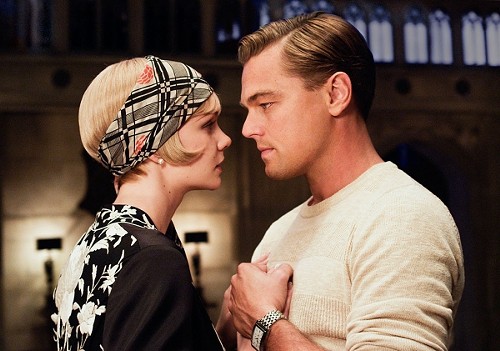The Great Gatsby
Baz Luhrmann's problem is more than not showing proper respect
By Scott Renshaw @scottrenshawWhat if Baz Luhrmann’s The Great Gatsby didn’t have to carry the burden of “The Great Gatsby”?
That’s not just some Zen koan-like riddle intended to inspire deep meditation; it’s a question about the way we look at a movie based on F. Scott Fitzgerald’s Great American Novel. Because an adaptation of this kind, more than most others, faces assaults from two fronts: those who are ready to be outraged at any violation of the nigh-sacred text, and those whose sphincters involuntarily clench at the recollection of frustrations in high school English classes. Too literary, or not literary enough—that’s Luhrmann’s lose-lose scenario.
And if his filmmaking career has demonstrated anything, it’s that he’s all too willing to put himself in those situations without seeming to give a crap. You think it’s a problem to turn William Shakespeare’s Romeo & Juliet into a funkified teen-stravaganza? Not Baz. You think it’s weird to turn pop chestnuts by Madonna, Elton John and Kiss into the grand opera of Moulin Rouge? Not Baz. There’s something perversely admirable about an artist so eager to take some of our most familiar cultural content, blow it up and twist it into multicolored balloon animals.
So what does Luhrmann do with The Great Gatsby? Well, he keeps the basics in place, as Nick Carraway (Tobey Maguire) becomes involved in the lives of wealthy Long Islanders in the summer of 1922. On one side of the bay is his cousin, Daisy (Carey Mulligan), and her old-money husband, Tom Buchanan (Joel Edgerton); on the other side of the bay is the mysterious Jay Gatsby (Leonardo DiCaprio), whose lavish parties hide a secret past and a desire to recapture a love that once seemed possible years earlier.
But from there, he can’t help himself from getting all … well, all Baz Luhrmann-y. Nick’s narration is turned into a framing device wherein part of his therapy involves typing up the Gatsby story; key phrases and passages literally appear onscreen even as they’re also pronounced in voice-over, all while Maguire himself turns into a walking reaction shot. Luhrmann gleefully drops anachronistic hip-hop beats into Gatsby’s parties, yet also mixes in the obligatory period Gershwin and Cole Porter tunes to create an unkempt aural mishmash. He sends his characters barreling down the road in a vintage car chase. Then there’s the decision to make it 3-D, which results in some unusual texture, yet keeps the focus on the visual cartwheels, rather than the compelling character at the center.
And it’s a tremendously compelling character as interpreted by DiCaprio, from the moment Luhrmann introduces him against a backdrop of bursting fireworks. This is not merely an abstract literary construct representing “the myth of American self-creation”; he’s a wonderfully human mix of boundless optimism and anxiety, wrapped up in his romanticized notions of Daisy’s place in his imagined future. That’s a part of the story that Luhrmann understands how to nail visually, crafting lush montages of Gatsby and Daisy’s time together that capture a bliss existing outside of time. But it’s DiCaprio’s performance that grounds the movie in something jittery, vital and even explosive when Tom dares to chip away at the happy-ending narrative Gatsby has constructed around himself.
The problem with Luhrmann’s Gatsby, then, isn’t that he doesn’t show enough respect for The Great Gatsby, the acknowledged literary masterpiece; it’s that he doesn’t show enough respect for Jay Gatsby, the powerful character around whom this story is built. Even if nobody had ever heard of this book by some obscure guy named Fitzgerald, this would be the wrong way to interpret this text and this protagonist cinematically—full of distracting fillips like typeface letters tumbling across the 3-D screen as though it were snowing alphabet soup. In a story that’s built on a man metaphorically grasping for the imagined happiness beyond that green light on the Buchanans’ dock, Luhrmann has Gatsby literally reach for it, like a 10th-grader straining to understand the symbolism.
So, grumble if you must at a filmmaker who had the audacity not to maintain scrupulous fidelity to this sacred source material. It’s simpler to realize the potential for trouble any time a filmmaker buries his best material under a mountain of look-at-me.
THE GREAT GATSBY
Leonardo DiCaprio,
Tobey Maguire
Rated PG-13
Speaking of...
-
Lounge Act Thursday: A night at the theater
- Mar 10, 2011
-
Can't Miss V-Day Dish
- Feb 14, 2011
-
Forbidden Loves
Romeo & Juliet and Stop Kiss deliver bittersweet theatrical valentines.
- Feb 19, 2009
- More »
More by Scott Renshaw
-
Film Reviews: New Releases for April 19
The Ministry of Ungentlemanly Warfare, Abigail, The Beast, Hard Miles, Sasquatch Sunset and more
- Apr 19, 2024
-
Faces of Salt Lake County book and portrait reception
Images and personal stories in a new book reveal local demographic diversity
- Apr 17, 2024
-
Feature film review: THE BEAST
A filmmaker's compelling ideas get a bit tangled in references to his creative influences.
- Apr 17, 2024
- More »
Latest in Film Reviews
Readers also liked…
-
Power Plays
Two satirical comedies explore manipulations and self-delusions by those with power.
- Aug 31, 2022





